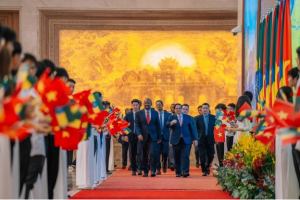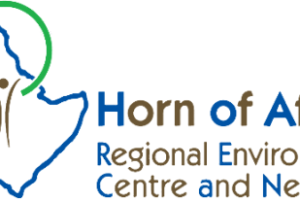BY DARGIE KAHSAY
Marking the 5th anniversary of the adoption of Paris Agreement on Climate Change, Ethiopia’s Environment, Forest and Climate Change Commission (EEC) has held a seedlings care and protection campaign for seedlings planted during the last rainy season around Akaki Kalit, Tulu Dimtu area.
The Paris Agreement was adopted on 12 December 2015 with consensus and deals with addressing greenhouse-gas-emission through three pillars named mitigation, adaptation and financing.
During the 2020 rainy season, from June to August, Ethiopia had planted over five billion seedlings across the country as part of its greenery campaign started in 2019 by Prime Minister Dr. Abiy Ahmed.
As the leading institution for the greenery campaign, EEC with its respective institutions has planted over one million seedlings in different sites, according to Deputy Commissioner. In the Tulu Dimtu site, staff of the commission have planted over 3,500 seedlings, he added.
Approached by The Ethiopian Herald during the event, EEC Commissioner Professor Fekadu Beyene said that Ethiopia gives due attention to reforestation and afforestation to tackle climate change. To fulfill its duty in protecting the world from climate change, Ethiopia is focusing on mass seedling plantation especially since 2019, by commencing the plantation of over four billion plants in single summer.
Prof. Fekadu added that as part of the greenery initiative, Ethiopia plants over five billion seedlings in 2020 rainy season. At this time, the commission’s workers have planted over one million seedlings in different sites.
“Today, we are cultivating, watering and caring for the planted seedlings during the past summer to memorize the fifth anniversary of the Paris Agreement adoption”, Professor Fekadu said. “Most of the seedlings planted in this site are olive and during the first survey study of this specific site on early November, over 98 percent of the seedlings have survived”, he added.
Now, since the dry season is coming, the commission started caring and watering the planted seedlings and is calling on the public to protect the seedlings they planted, Prof. Fekadu said.
According to Professor Fekadu, during the first survey for the 2019 planted seedlings over 84 per cent were survived while the final survey study report proofed that from the four billion seedlings, over 78 per cent have survived. “We are working to grow-up over 85 per cent of the five billion seedlings planted in 2020”, the commissioner added.
For the Commissioner the public is now aware about the caring and protection of plants especially from the movements of last year experience and the commission is also investing more on protection and caring of the seedlings.
So far our focus was mainly shielding the site areas where seedlings were planted from animals to protect their safety since there was moisture, but now since the dry season is coming watering is necessary for the seedlings.
To boost up the growing rate of the seedlings to meet the target, watering especially in the dry areas, cultivating the surrounding and removing unnecessary weeds and protecting from animals at this time is critical.
The Commissioner noted that in the coming ten years, Ethiopia plans to boost its forest coverage to 30 percent, by increasing the current forest coverage which is only 15 percent. As to him to meet the target, mass plantation and giving serious attention for their survival is not only crucial but also a must to do.
In addition to planting new seedlings, protecting the forest areas from unnecessary removal is also critical for the forest coverage development. “Forest development is a matter of life and death for human beings; in addition it is important for job creation, food security and environmental protection”, he noted.
Parallel with the protection of the planted seedlings, the commission is also working to prepare six billion seedlings for the coming rainy season as the technical committee has established an action plan to properly manage the process.
Based on the direction of Prime Minister Dr. Abiy Ahmed, the commission is working to distribute one billion seedlings to neighboring countries and “we are working based on our plan”, the commissioner stated.
Moges Atsike, civil servant at EEC was attending the event to water the seedlings he planted last summer in Tulu Dimtu site of EEC. Moges told The Ethiopian Herald that he had planted more than 50 seedlings in 2020 summer season in four rounds. Almost all of his trees are surviving.
“I found all of my seedlings sprouting properly, except three of them that tended to be a bit slower. I will try to follow them up periodically. My plan was to see 90 percent of my seedlings to sprout”, Moges said.
EEC Deputy Commissioner, Kebede Yimam on his part said that during the 2020 greenery campaign over five billion trees, fruit and animal fodder seedlings were planted. He added that from this over 3.5 million of the planted seedlings were trees. “Now we are providing care and protection for the planted seedlings, which is the most critical part of the greenery campaign to meet the target”, Kebede added.
“To become an exemplary to the public, the Commission’s workers started today their first round caring of the seedlings they had planted”, the Deputy Commissioner said. Now, forest development is becoming a serious national agenda following the Prime Minister Abiy’s greenery initiative of 2019.
Although climate change is a global issue and needs global actions, especially for mountainous countries like Ethiopia forest development is a matter of people’s survival. Especially starting from 2020, the seedling campaign gives due attention for food security and animal foods in addition to protecting the ecosystem and tackling climate change, the deputy commissioner stated. From the 2020 planted seedlings over 1.5 billion were fruits and cattle feed, he added.
For Kebede, in addition, the trees also include species that are suitable for construction inputs to substitute importing of wood products from abroad in the near future. “Ethiopia is importing a huge amount of forest products from abroad with hard currency, but if Ethiopia gives attention for its forest development, not only substituting the importing but also it has the capacity and a comparative advantage for the exporting of forest products to its neighbors and to the Middle East,” he added.
The tree planting journey started before two years is a good journey for Ethiopia to mitigate the climate change and to produce its forest products consumption locally in the coming years. But, for the successful forest development, plantation and protection for the survival of the seedlings is an obligation for all Ethiopians.
The Ethiopian herald December 16/2020





